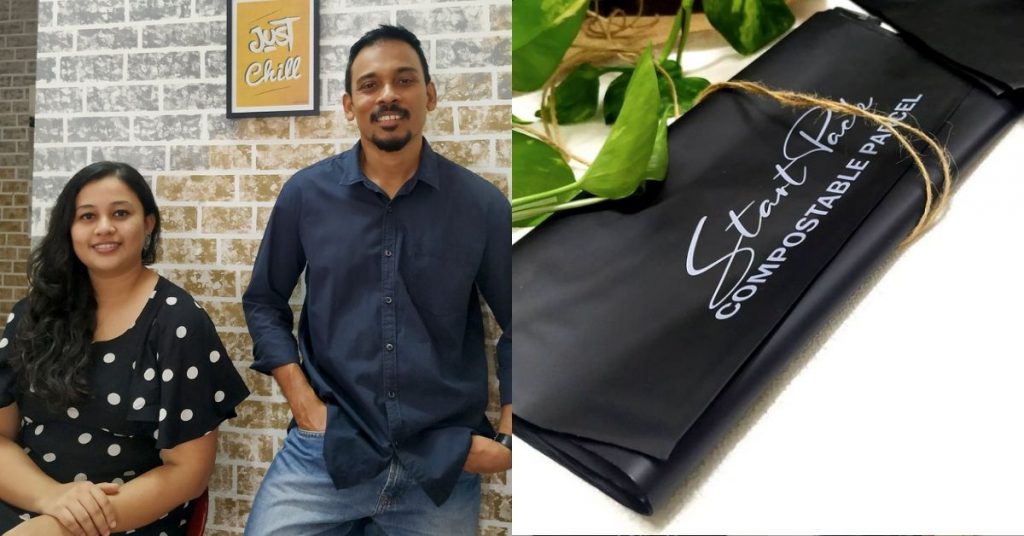The excessive use of plastic packaging in many of our consumption behaviours has been a concern for a long time now.
Over the years, we’ve definitely seen multiple startups tackle the issue, usually in the F&B sector.
One that we’ve written about recently was Circlepac, which makes and sells compostable food packaging after seeing the rising demand for food deliveries during MCO.
With online shopping on an ever-increasing incline as well, one startup has decided to address the issue with plastic e-commerce parcel packaging.
Plastic That Disappears
Sold by Deva’s company, Startachi, StartPack Compostable Packages says it all in its name. The parcel satchel can fully break down within 180 days and it’s made from plant-based materials like cornstarch and PBAT.
Dictionary Time: Short for polybutyrate adipate terephthalate, PBAT is a copolymer that’s flexible and easily broken down.
To properly dispose of it, they advise customers to cut the package into small pieces before putting it into a compost bin. Of course, it can break down in a landfill even if it ends up there, though it takes much longer—about 2 to 3 years—to do so.
An eco-friendly parcel packaging sounds like a great idea for consumers and businesses alike. However, it comes at a high cost that businesses may not be willing to hop on to so quickly.
Convincing Online Sellers To Convert
Because the StartPack’s material breaks down, it can only be stored for up to 10-12 months in a dark and cool environment.
Startachi only has one size available (260 x 385 mm) for their parcel satchels currently. For a size comparison, it’s slightly larger than Poslaju’s M Sized Flyers Pack, able to hold up to 1.5kg.
A set of 50 for StartPack’s satchels costs RM59. Compare that to Poslaju’s M Size ones, sellers could get the same amount for just RM11.
Speaking to Vulcan Post, Deva explained that regular plastics are cheaper because of their high demand in various sectors. It’s also easy to mass-produce and cheaper too.
“Whereas compostable packaging has not been adopted by many. I believe when big companies start adopting compostable, sustainable packaging, the price would eventually fall, equal to regular plastic,” she clarified.
As of now, Startachi’s customers comprise small sellers on Instagram, Facebook, and Etsy. Deva added that the company is taking extra steps to introduce StartPack to bigger businesses in making the switch.
With climate change and the adverse effects of single-use plastics being a somewhat neglected issue in our country, Startachi has a huge gap to fill. Convincing businesses to make the switch will require educating them first.

Hence, Deva already has plans to push out such promotions online while collaborating with influencers to educate customers.
Since launching in February 2021, Startachi already has 6 clients who’ve purchased the StartPack Compostable Parcels, a promising development for Deva.
“To add on, my sister’s art business, Fullachi, has sent almost 50 parcels with our packaging. That means they’ve saved 50 plastics (and counting) from going into the landfill or ending up on the ocean bed,” said the hopeful environmentalist.
Of course, it comes with awareness and responsibility from end-consumers too. So, businesses using StartPacks should provide instructions on how to dispose of the packaging responsibly.
A Triggering Moment
An environmental advocate since young, keeping trash off the streets and dissuading family from littering has always been Deva’s personal mission.
Later in college, Sustainable Building was a module taught in her Interior Architecture course. The subject only grew her intrigue for the environment.
Over time, she’d come across articles, news, and social media posts about climate change. She observed, “Whatever I learnt gave me an insight into what I should do instead of just feeling bad.”
Starting small, Deva and her brother created their first zero waste product in 2019, a kitchen dishwashing scrub made of coconut coir (fibrous material found between the internal and outer shell). Just like StartPack, it was 100% compostable and was sold in zero waste stores.

But it wasn’t enough. She still worked part-time for her sister’s art business packaging products in layers of plastic bubble wrap. Worried, she questioned, “If we, as one business, are producing so much waste, what about consumers purchasing from multiple businesses?”
Her concern heightened the more she thought about it, especially after reading that Malaysians were named as Asia’s worst plastic polluters in February last year.
“I understand, there are many areas we need to cover if we want to stop single-use plastic pollution completely, but I can’t do it alone. As an individual, I thought I could do something more impactful by focusing on one area,” said Deva.
That something was under her nose the whole time, something she was already doing on the daily—delivery packaging. Roping in her siblings once more, a year of R&D while hunting down alternatives landed them on compostable parcel packaging.
As Malaysia lacks the facilities to manufacture such products, bulk orders are outsourced from Australia for now. To offset carbon emissions from shipping, Deva is funding climate projects involved in forestry and renewable energies.
She added that the team is already in discussions with a few local companies to manufacture the compostable parcel satchels here.
For now, she’s keeping Startachi’s goals modest by first getting more businesses switching to their compostable parcel packaging.
Compostable parcel packaging is completely new to our country and it’s absolutely foreign for most people who aren’t even aware of climate change and plastic pollution. What we’re trying to do is a slow process yet a worthy one.
Deva Darishiny Kunasantar, co-founder of Startachi.
- You can learn more about Startachi here.
- You can read more about Malaysian startups we’ve covered on here.
Featured Image Credit: Deva Darishiny Kunasantar, co-founder of Startachi













